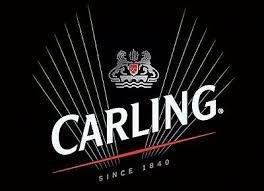
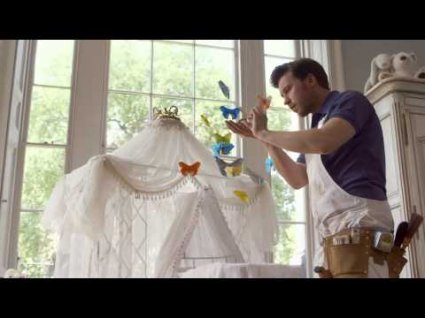
Carling:
“Decorators” Ad-
It’s a Boy
Another advert capitalizing on the royal birth was Carling. Even
though this brand is not something that is well-known worldwide, their
advertising tactic to focus on a highly covered news event made the company
seem accessible to the general public on an international scale.
This advert added comedy and pulled off a high quality
online advertisement in a matter of days after the birth of Prince George
Alexander Louis of Cambridge. The Carling advert was creative in its objective
to have a congratulatory message. Its original use of humor helped this online
advert hit almost 5,000 “likes” within the first six hours of its release (Trendolizer.com,
2014).
Created by Creature of London Advertising, is a part of the “not
quite Carling” campaign and is the third digital short for the acting partners “Dylan”
and “John.”
The brand director of Carling, Jeremy Gibson, released a
comment on this advert stating:
“As Britain’s number
one beer what better excuse to raise a glass than the birth of the Royal Baby?
As the big day approached people have spoken of little else, so we thought it
would be great to celebrate the birth with a bit of classic tongue-in-cheek
Carling humor and congratulate the Royal couple on their new arrival. Carling
has a reputation for making adverts that provide an amusing take on current
events. It’s a tradition that we’re keen to continue, so watch this space in
the coming months,” (LBBOnline, 2014).
This advert went viral! Online blogs, Facebook pages,
everyone raved or at least had something to say about this advert. There are
questions from the public if the advertisement was appropriate with humor.
Unlike the Coca-Cola advert, Carling did not take a minimalistic congratulatory
approach. I feel as though that was a highlight of Carlings advertising
direction. Among the many “Celebrate with William and Kate” messages, Carling
was the first to make an advert that set itself apart.
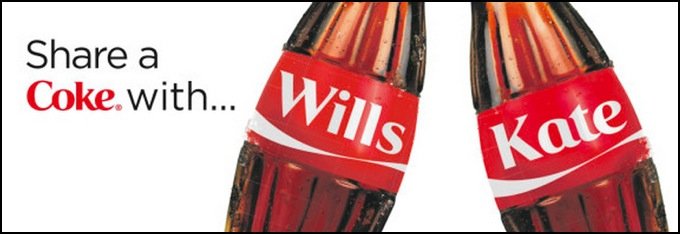
Time for a Royal Celebration:
Share a Coke with Wills and
Kate
When Prince William and Kate Middleton debut their son,
Prince George Alexander Louis of Cambridge, to the world the entire world
entered frenzy. This wasn’t only a widely covered issue for England, but also
from country to country. Even in America the public awaited the arrival of the
new heir, advertisements capitalized on this new addition to the royal family
and released series of adverts on a world scale.
Coca-Cola released a non-descript advert of congratulations
soon before the birth entitled: “Time for a royal celebration… Share a Coke
with Wills and Kate.” The positioning of the Coke bottles was in the form of a
“cheers.” The nod to the royal family that the public was wildly awaiting was
an ingenuous move for the Coca-Cola advertising company. The company’s drive to
become a part of the news-driven cultural movement worked to the advantage of
Coke’s previous hashtag campaign from New Zealand and Australia. It was also
one of the first companies to release a congratulatory message in the public.
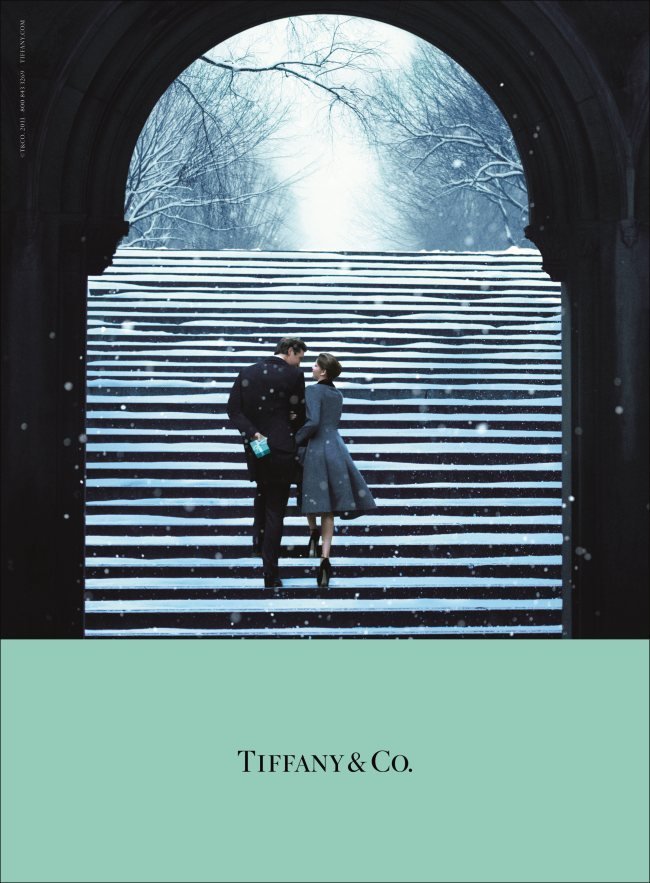
Tiffany & Co. Holiday Campaign 2011
I selected the Tiffany & Co 2011 Holiday campaign for a
creative international campaign due to its amount of advertising coverage.
Covered in international magazines like W,
Elle, Glamour, and People this
advert received coverage worldwide.
Tiffany & Co is known for its advertising directive of
luxury and the perceived notion of what love is supposed to be. In the holiday
2011 campaign they featured Laetitia Casta, a former Guess and Victoria’s
Secret model, and Lee Pace, a famous American television and silver screen actor.
It shows what every woman in love would like to imagine their holiday season.
The advert shows Casta and Pace as a loving couple in snowy New York City, one
variation even shows the pair building a snowman (Sam, 2014).
It was one of the first advertising campaigns that made me
want to go into advertising. As a high school student, I cut out the advert
from every magazine I could and hung it in my room. This idealistic aspect of
love and hope during the holiday season is exactly what Tiffany & Co was
aiming for. The adoration for family, friends, and lovers runs high especially
during the holidays and Tiffany’s capitalized on those feelings.
BusinessWeek comments on Tiffany & Co’s income. At the
end of this holiday season Tiffany & Co had a total of $2,151.4 million
gross profit at the end of their fiscal year (Businessweek, 2014). And in the
annual report Tiffany & Co spent $234.05 million, only 6.4% of net sales,
on advertising. This advertising includes cost for worldwide advertising, which
in turn includes costs for media, production, catalogs, Internet, visual
merchandising (in-store and window displays), marketing events and other
related items (Investor.tiffany.com, 2012).








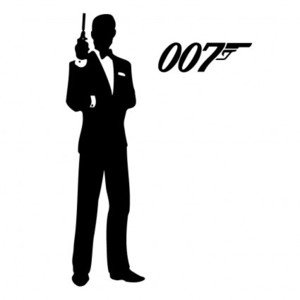
This advert was another example of Coca-Cola’s achievements
in viral video advertising. The newest Bond movie released in 2012, “SkyFall,”
was an international success. The campaign highlighted both the movie and
Coca-Cola’s Coke Zero product. I included this in my “Internationalism”
portfolio due to the fact that it covered one of the top 2012 grossing movies across
the world. The use of recognizable music, a fun tagline, and exciting candid
actors aided to the viewing pleasure of this viral ad.
The creativity of this advert comes from the structure. The
“reality” of this scenario and following unknown suspects through an everyday
venue made this advert have a sense of realness. Coca-Cola is, at the point of
the release of this video, known for their entertaining and viral commercials.
I do not feel that it would be out of line to say that this is a strong suit in
their marketing endeavors. Coca-Cola is also one of the first companies to
create adverts like this.
The “Coke Zero drives you to unlock the 007 in you,” video
was shot at the Central Station of Antwerp in Belgium inviting real consumers
to unlock the 007 in themselves and overcome a “mission” to win exclusive
tickets for the movie “SkyFall.”
The viral effect of the video was unprecedented; the new
Coke Zero product was put on the map by this advert. The advert broke
Coca-Cola’s company record for online views and engagement. As of 1 November
2012, the high reach was 7.1M views on YouTube with 98% “likes” and 832.3k
“shares,” (Palmen, 2014). The video was placed in Mashable Top 100 most shared
commercials ever and is still being “shared” through social media today. Also, the video is the most shared Bond
related ad and in the Top 3 YouTube search results of “007,” (Palmen, 2014). I
would say this advert was ultimately successful.

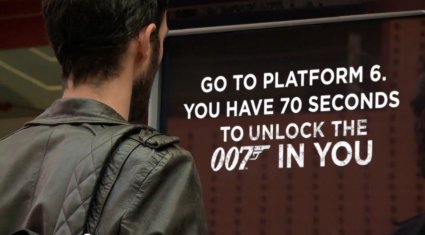
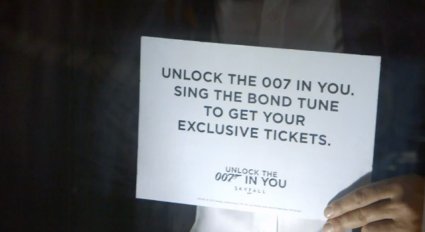
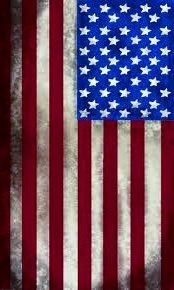
“America the Beautiful”
Coca-Cola campaign

This advert was included in my theme of Internationalism
because I feel it represents cultures instead of a particular nationalism
feeling. It took a notion of pride in your country and made consumers look at
the bigger picture.
This advert received backlash due to its controversy. It is one
of the most ground-breaking and creative advertisement campaigns released over
the past year. This social responsibility centered campaign made consumers take
a second look at their society, and it would be difficult to find another
advert that has done that.
This one minute advert was shown, in its full, during the
American 2014 Superbowl. This caused social media to go into frenzy and split
Coca-Cola’s audience on the matter. According to a company release, Coca-Cola
wanted to debut a 90-second version of the advert during the Winter Olympics on
February 7 of the same year. "We hope the ad gets people talking and
thinking about what it means to be proud to be American," said Katie
Bayne, president of Coca-Cola North America, in the release (Lee, 2014).
There were no known specifics on how this advert affected
total net revenue, but the advertising costs are approximately $4 Million for a
30-second advert. This America the Beautiful advert had to have cost Coca-Cola
somewhere around $8 Million (Kay, 2014).
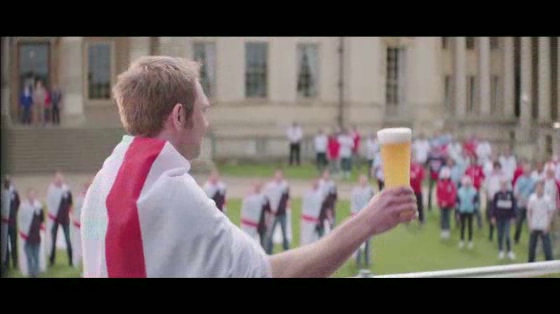
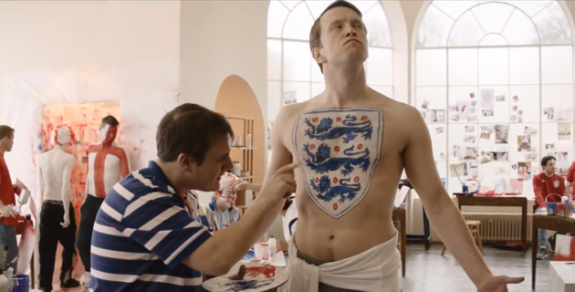
I chose this due to the fact that being an international
student, I was fully able to appreciate and understand it. Even though it was
not shown anywhere other than the United Kingdom, I feel it represents
internationalism well.
It was a creative commercial highlighting one of the biggest
sporting events of the year (the European Championship football tournament). Through this advert, the consumer was able to
feel like an active member of the game and root for their chosen team. Instead of focusing on the actual product,
the advertising structure focused on the feeling of inclusion. The consumer was
the focus instead of the actual product.
This advert, normally too lengthy to be shown on television,
had its own TV spot. It marked the first change to the branding since it chose
a new tagline (“That Calls for a Carlsberg”) in 2011 (Joseph, 2012).
With the help of this advert, Carlsberg’s sales in beer went
up by 1.01%, and their net revenue increased by 1.06% (Carlsberg Group, 2012).
And although there is no direct statement accrediting this increase to the 2012
advert campaign, one can only assume.
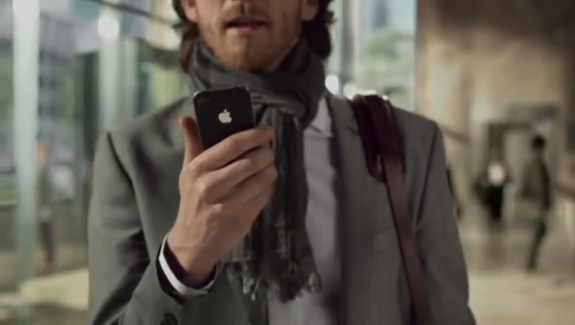

I selected this advert because for its time, it showed the
consumer something that no other competitor had. It was a universal way to
highlight the features of the product in real life. I found this creative due
to the fact that it was the first advert worldwide to show something new, and
also showed the consumer how the future affects everyday life. Variations of
this were shown in the United States as well, making it a perfect example of
global marketing.
It was made for a television spot, being only 30 seconds
long, by iPhone Apple. It was released in 2011 and was among a series of
adverts highlighting the Siri feature on the new 4s’. This feature-centered
approach to advertising seemed to highlight the product effectively.
Forbes online released an article on this advert recording a
few financial tidbits:
“According to its annual filing, Apple spent $933 million on
advertising last year, $691 million in 2010, and $501 million in 2009. Its
total sales those years were $108.249 billion, $65.225 billion and $42.905
billion.
Translation: Apple spent less than 1% of sales last year on
advertising. And its sales growth has been far outpacing its advertising
budget.” (Forbes, 2012)
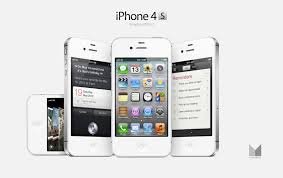
Global advertising is “[advertising] on a worldwide scale reconciling or taking commercial advantage of global operational differences, similarities and opportunities in order to meet global objectives,” this definition was the basis for my choice in portfolio. After much deliberation, I decided on “internationalism” as my theme. Being an exchange student, I found it was important for me to find something easily relatable, yet also something that I could find interesting advertisements on. My basis for my chosen theme is adverts that bridge cultural gaps.
In the business world today, it is becoming increasingly
important to be a diverse and open-minded firm. Also it is becoming gradually more
vital to the success of a company to produce adverts on an international scale.
More and more ads are learning to focus on diversity in order to keep their
adverts and product line adaptable. This theme is not only important on a
business scale, but is something that also hits a bit closer to home. Being an
international student, this theme is something that I can relate to.


Back Next
 Magazine Posts
Magazine Posts Table of Contents
Table of Contents